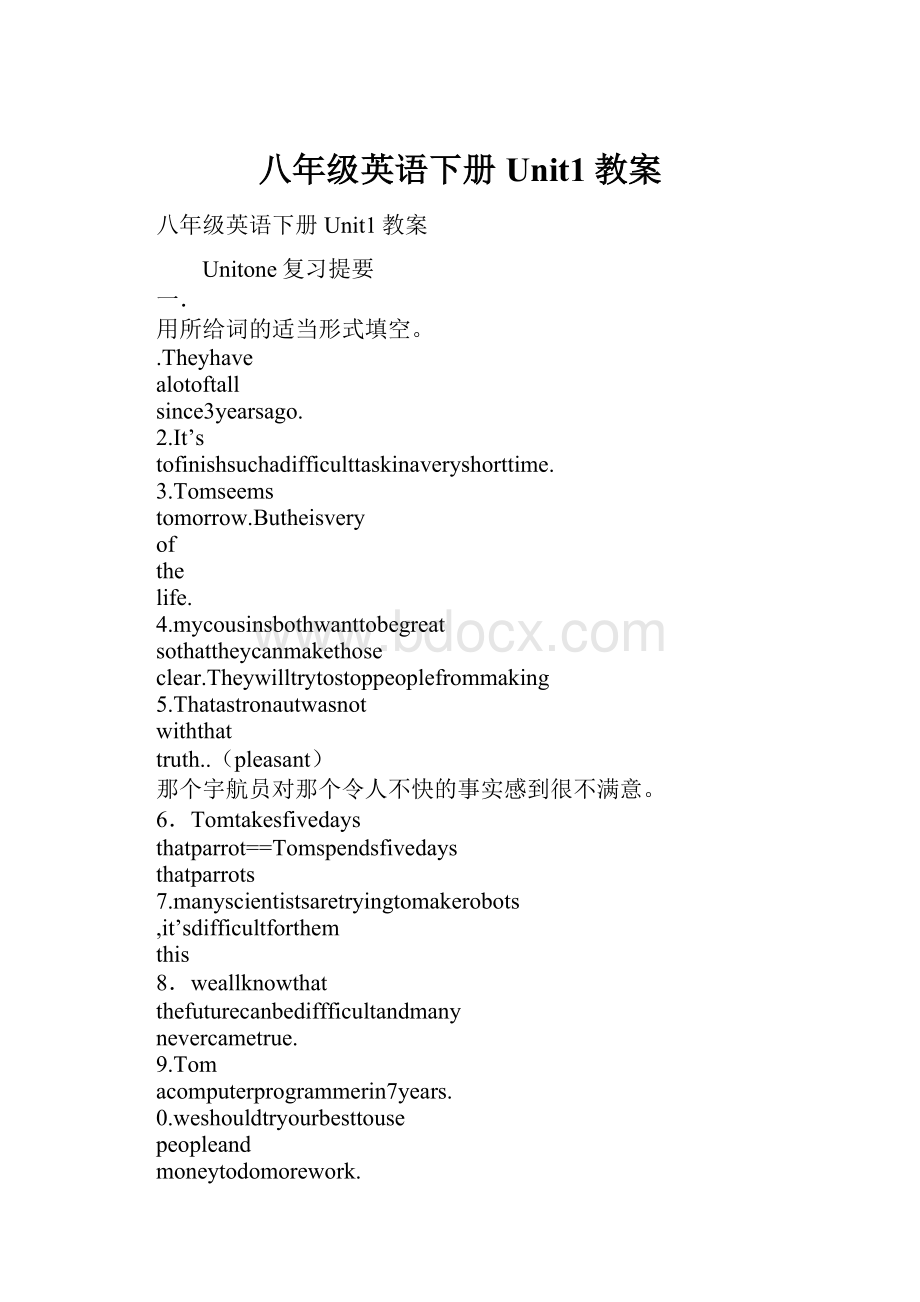 八年级英语下册Unit1教案.docx
八年级英语下册Unit1教案.docx
- 文档编号:14436662
- 上传时间:2023-04-23
- 格式:DOCX
- 页数:15
- 大小:25.46KB
八年级英语下册Unit1教案.docx
《八年级英语下册Unit1教案.docx》由会员分享,可在线阅读,更多相关《八年级英语下册Unit1教案.docx(15页珍藏版)》请在冰豆网上搜索。

八年级英语下册Unit1教案
八年级英语下册Unit1教案
Unitone复习提要
一.
用所给词的适当形式填空。
.Theyhave
alotoftall
since3yearsago.
2.It’s
tofinishsuchadifficulttaskinaveryshorttime.
3.Tomseems
tomorrow.Butheisvery
of
the
life.
4.mycousinsbothwanttobegreat
sothattheycanmakethose
clear.Theywilltrytostoppeoplefrommaking
5.Thatastronautwasnot
withthat
truth..(pleasant)
那个宇航员对那个令人不快的事实感到很不满意。
6.Tomtakesfivedays
thatparrot==Tomspendsfivedays
thatparrots
7.manyscientistsaretryingtomakerobots
,it’sdifficultforthem
this
8.weallknowthat
thefuturecanbediffficultandmany
nevercametrue.
9.Tom
acomputerprogrammerin7years.
0.weshouldtryourbesttouse
peopleand
moneytodomorework.
二.写出下列短语
.三只电动牙刷three
2。
太空站
3。
好几百只鹦鹉
of
4。
在未来
the
4.形状不同的巨大的机器人
robots
different
5.实现梦想realizethedream===makethedream
6.驾飞船到月球
tothemoon.
7.fallinlovewith
8.穿戴更随意些
more
9。
Bethesameas反义bedifferent
0.活到200岁live
twohundredyearsold.
1.通过电脑在家学习
studyathome
三.重点句型1havefundoingsth.
【句型介绍】意为\"做某事有乐趣",其中havefun相当于enjoyoneself,表示过得愉快。
【句式比较】haveagood/nice/wonderfultimedoingsth./withsth.
Didyouhaveagood/nice/wonderfultimevisitingthatcountry?
访问那国家你们快乐吗?
另表“做某事费力”havetrouble/difficulty/problems/ahardtimedoingsth./withsth.
【特别提醒】句中fun及trouble为不可数名词,前不能用冠词。
可用great、much、alotof,lotsof等修饰。
习题1.it’s
fun
(swim)inthesea,wehadgreatfun
(goswimming)there.
2.whatfuntheyhad
thatamusementpark.
3.Noneknowswhatgreattroublewehad
yourhouse.
4.wehadfunplayingcomputergames.我们玩电脑游戏很愉快。
2英语中集体名词,如family,class,team等作主语时,若作为一个整体看,其后的谓语动词用单数;若强调其组成成员,谓语动词用复数。
类似还有police和the+形容词表一类人时
myfamilyisahappyone.
myfamilyareallwatchingTV.
3在比较级中,要注意than后面人称代词的格。
)当句中的谓语动词是不及物动词时,than后代词用主格还是宾格,意思上通常没有区别。
如:
HerunsfasterthanI/me.他跑得比我快。
Theygettoschoolearlierthanwe/useveryday.他们每天都比我们到校早。
2)句中谓语动词是及物动词时,than后面人称代词用主格还是宾格在意思上就有差别了。
试比较:
Ilikeyoumorethanhe.我比他更喜欢你。
Ilikeyoumorethanhim.你和他相比,我更喜欢你。
在比较句型中,than后面的谓语动词常常省略。
也可以用相应的助动词来代替与前面相同的谓语动词,以避免重复。
如:
TomdoesbetteratthelessonsthanI.汤姆功课比我好。
SheatelessthanIforbreakfast.她早饭吃得比我少。
4.不定式作定语时,应放在被修饰词的后面,一般指一个还没有发生的动作。
如:
Doyouhaveanythingtosayaboutthis?
有关这件事你有没有什么要说的?
5.you\'dbetter...是youhadbetter...的缩写形式。
hadbetter为固定短语,意为\"最好......\",后接动词原形,常用来提出建议或劝告,其否定形式是\"hadbetternot+动词原形\"。
you\'dbetternotstaytheretoolong.你最好别在那里呆得太久。
6.Such作形容词,意思是“如此的”“这样的”,修饰各种名词。
Such这样的。
如Itissuchbadweather.天气如此恶劣。
Such常和表示结果的that从句搭配,表示“如此….以至于…”如
Itwassuchahotdaythatweallhadtostayathome.
Such…that…和so…that…都可用来引出一个结果状语从句。
由于such是形容词,所以that从句前有一个受such修饰的名词;而so是副词,用以修饰形容词或副词,因此that从句前一般不出现名词。
如
Theyaresuchkind-heartedteachersthatpeopleinthevillageallrespectthem.
Theexamwassodifficultthatmanystudentsfailedtopassit.
a)如名词是可数名词的单数形式,such和so位置不同:
such+a/an+形容词+单数名词=so+形容词+a/an+单数名词即suchanicegirl=soniceagirl
b)如果名词是不可数名词或名词复数,只可用such,不能用so.:
such+形容词+不可数名词或复数名词,如:
suchgoodweather,
suchclever
kids
c)如果被修饰的不可数名词被much,little,或复数名词被many,few等表示量的形容词修饰时,用so,不用such.
语法要点一般将来时的用法:
1)表示将要发生的动作或情况;2)不以人的意志为转移,肯定要发生的事情。
ThedayaftertomorrowwillbeNationalDay.后天是国庆日。
3.in/after:
in是指以现在时间为起点的“在一段时间以后”。
也可以表示“在将来多少时间之内”,句子中的谓语动词要用一般将来时态,对此提问用howsoon
after常指以过去时间为起点的“一段时间之后”,所以它与过去时态连用。
当after指某个特定的未来时刻或日期之后,或指以将来某一时间为起点的若干时间之后时,它可以与将来时态连用。
用”begoingto+动词原形”也可表示将来时,表示将要发生的事,打算或决定要做的事。
4.more,less,fewer的用法区别:
more为many,much的比较级,意为“更多”,可修饰可数与不可数名词。
Less是little的比较级,意为“更好,较少”,修饰不可数名词。
Fewer是few的比较级,意为“更少”,修饰可数名词复数。
【注意】few,little表示否定“几乎没有”==hardlyany或notmany/notmuch。
afew==several
alittle表示肯定“一点,几个”=abitof……。
5.wouldlikesth意思为“想要某物“;wouldliketodo意思为“想要做某事”。
回答wouldlike句型的一般疑问句时,其肯定回答为“yes,please.”;否定回答“No,thanks”或“I’dlike/loveto,but….”
d)当little表示“年纪小的”时,可用such+little+名词。
单选题1.It________usnearlyawholedaytofinishthework.
A.used
B.cost
c.took
D.spent
2.Thereis________waterinthejar,isthere?
A.few
B.little
c.afew
D.alittle
3.Thisbasketis________thanthatone.youcancarrythelightone.
A.moreheavier
B.muchheavy
c.muchheavier
D.veryheavier
4.It’spolite________theold.weshouldlearnfromyou.
A.ofyoutohelp
B.foryoutohelp
c.ofyouhelping
D.foryouhelping
5.Therearethree________studentsintheirschool.
A.thousandsof
B.thousandof
c.thousands
D.thousand
6.There________animportantmeetingthisafternoon.Allofyoushouldattendit.
A.willhave
B.willbe
c.willhold
D.has
7.—________willyoucomebackfromyourwork,Dad?
—Inabouthalfanhour,dear.
A.Howlong
B.Howoften
c.whattime
D.Howsoon
8.Thebossmakestheworkers________longhourseveryday.
A.work
B.towork
c.works
D.working
9.wehadfun________therobotsdomanydifferentkindsofthings.
A.towatch
B.watched
c.watching
D.watches
10.—willyouplease________dothat?
—ok,Iwon’t.
A.won’t
B.not
c.don’t
D.can
1.凯蒂不能参加运动会了。
kitty____________________________________________takepartinthesportsmeeting.
2.昨天有好几百人来我们学校参观。
______________________peoplecametovisitourschoolyesterday.
3.彼得在上海找到了一份工作,他不得不在那里独自生活。
PeterfindsajobinShanghai,sohehasto___________there___________.
4.我们家乡的污染没有以前严重了。
Thereis______________inourhometownthanbefore.
5.十年后你会是什么样子?
what____________________________________________intenyears?
根据要求完成句子(5分)
61.Therewillbeasportsmeetingthisweekend.
There_________________________________beasportsmeetingthisweek.
62.IthinkSallywillbeadoctorinfiveyears.(对画线部分提问)
______________________youthinkSally______________________infiveyears?
63.Therewillbefewerpeoplein100years.
___________there___________fewerpeoplein100years?
64.Therewon’tbeanypapermoney.
Therewillbe______________________money.
65.myclassmatesoftenhelpmelearnEnglish.
myclassmatesoften___________me___________myEnglish.从方框中选择合适的句子完成对话。
(有两项多余)
DavidandTinaaretalkingaboutwhattheyaregoingtodointhefuture.
T:
whatareyougoingtodoafterleavingschool?
D:
Iliketovisitdifferentplaces.__________
T:
__________
D:
ofcourseIdo.
T:
That’sgood.youaregoodatspokenEnglish.__________
D:
Really?
I’mtryingtolearnitbetter.__________
T:
maybeI’llbeaPEteacher.Ifeellikeplayingallkindsofgameswithchildren.
D:
__________
T:
yes.Ihopemystudentswilllikeme.
D:
Goodluck!
A.whatdoyouwanttobe?
B.Doyouliketraveling?
c.Isthatright?
D.Itseemsthatyou’llenjoyyourwork.
E.Areyougoingtobeateacher?
F.Iamthinkingaboutbecomingaguide.
G.Great.Iwillbeproudtobeateacher.
书面表达(10分)
假如你是jack,你有一个梦想,希望将来你家能有一个叫Superman的机器人帮你做很多事情,还可以和你一起玩。
请展开想象,以mydream为题写一篇80词左右的短文。
mydream
I’mjack.I’mdreamingofamorerelaxinglifeinthefuture.Iwillbuyalargeapartmentformyfamily,IhopeIcanhavearobotcalledSuperman.Itwillhelpmecleantheroom,cookthemealandfeedmypetdog.Itwillbeabletoplaysoccerwithme.IfIamhurtorill,itcanlookaftermewell.Therobotwillbeoneofmybestfriends.Ialsowanttobeanastronautandflyarockettothemoon,andifpossibleIwillliveonaspacestation.
Ithinkmydreamwillcometruesomeday.
Unit2复习提纲
一.
词汇
.不让……进入教室==keep……
theclassroom
向……外看lookoutof…..
2.与某人打架havea
withsb.==fightwith
3.与某人争吵
withsb。
==have
withsb。
4.许多好建议many/alotof/lotsof
suggestions(可数名词)====muchadvice
5.时尚的Instyle==fashionable===trendy--------------反义词落伍的/不时髦的outofstyle
5.你怎么了?
what’swrong
you?
===what’sthe
you?
==whatishappening
you?
6.一张球赛票a
aballgame.
7.通过电话谈论那电影talk
themovie
thephone
8.给某人打电话callsb.
==ringsb.up===givesb.acall==makeatelephonecalltosb.
9.从……买礼物buygiftsfrom。
。
。
反义短语sellsth.
Sb.把某物卖给某人
0.我能借您的词典吗?
canI
yourdictionary?
===canyou
meyourdictionary?
borrow,lend:
borrow“借入,借给”即说话人向他人借东西borrowsthfromsb.;lend-lent-lent“借出,借给”即说话人把自己的东西借给他人lendsbsth=lendsthtosb
1.把A与B相比较
A
B
把A比喻成B
A
B
2.抱怨作某事
about
doingsth。
二.重点知识点
..loud是形容词,loud-louder-loudest意思是“响亮的”;作副词时,常与talk,sing,laugh等词连用,如speakloud;
loudly“大声地”带有喧闹的意味,常用来修饰shout,cry,call,knock等动词,通常没有比较级和最高级,作状语;
aloud副词,出声地,大声地,仅指发出声音(以使能被听得见)。
2.Enough为形容词,意思是“足够的”;enough+n.修饰名词常放名词前面enoughmoney;adj/adv+enough修饰形容词或副词必须放其后边;后常用todo或forsb.todo足够做某事
3.except,besides除…之外:
except除了…都,在noone,nobody,nothing等词后加介词but也表示“除了”。
后边代词必须用宾格且其后的成分不影响前边主语的数,
besides==with强调“除了…之外还有…”
TomwenttotheDisneylandbesideskate.除了有凯特汤姆也去了迪斯尼乐园
类如with,togetherwith,aswellas后的成分也不能影响主语。
Nobodybutthetwins
beentothatcity.
A.have
B.has
c.had
D.is
Theclassexceptlily
fromEnglish-speakingcountries.
A.comes
B.is
c.are
D.iscoming
4.findout,find,lookfor,lookup:
findout“找出,发现,查明”多指通过调查,询问,打听,研究之后搞清楚,弄明白或指找出较难找到的,无形的抽象的东西;
find“找到,发现”通常指找到或发现有形的东西也可指偶然发现某物的某种情况,强调找的结果;
lookfor“寻找”强调动作。
Lookup查找单词/地点
5.talkabout谈到,谈论;talkof谈到,说到;haveatalkwith与..谈谈,做报告;talktosb对…谈话;talkwithsb与…交谈;talktosb和talkwithsb均表示“和某人谈话”,“讲话”。
talktosb比较常用,侧重一方谈,一方听;talkwithsb侧重双方交谈;talkaboutsb则表示“谈论某人”
6.miss.女士,后跟姓氏,如:
missli
。
思念
Imissyouvery
much
错过miss后必须用动词的ing形式==failtodo
Hemissedcatchingthebus===hefailedtocatchthebus.
.Bemissing==belost=begone丢了,不见了
mypenismissing==mypenislost==mypenisgone
7.own与have:
own强调的是拥有,占有某物为自己的财产,但所占有的东西目前不一定是由人使用,强调所有权;have为普通动词,表示的所有关系。
英语中表“……自己的……”不能用oneself’s必须用one’sown…”如:
myownguitar
ofone’sown完全属于某人自己的;onone’sown独立地,自愿地;withone’sownears亲耳。
Iwon’t
believeyouuntilIseeitwithmyowneyes直到我亲眼见到我
8.attend,join,takepartin:
attend“出席,参加,上学”attendschool上学,attendmeeting出席会议;
takepartin参加,是指参与某项活动takeanactivepartin积极参加;
join参加,当join用于加入某个团体或组织,成为其中的一员,后面直接跟名词,当join表示参加某项活动时后面跟介词in.
三.重点句型
.主语+think/find/make/feel+it作形式宾语(此处不可用其他词替代)+todo不定式作真正宾语
()whenthosekidsareadults,theymightfind
difficulttoplanthingsforthemselves.
A.
it
B.that
c.
this
D.that’s
2.“疑问词+不定式“结构相当于一个从句==疑问词+句子主语+一个情态动词+动词原形
如,wheretogoisstillaquestion.=whereweshouldgoisstillaquestion.
wedon’tknowwhentoleaveforshanghai.
=wedon’tknowwhenweshould/can/mustleaveforShanghai.
3hear
- 配套讲稿:
如PPT文件的首页显示word图标,表示该PPT已包含配套word讲稿。双击word图标可打开word文档。
- 特殊限制:
部分文档作品中含有的国旗、国徽等图片,仅作为作品整体效果示例展示,禁止商用。设计者仅对作品中独创性部分享有著作权。
- 关 键 词:
- 年级 英语 下册 Unit1 教案
 冰豆网所有资源均是用户自行上传分享,仅供网友学习交流,未经上传用户书面授权,请勿作他用。
冰豆网所有资源均是用户自行上传分享,仅供网友学习交流,未经上传用户书面授权,请勿作他用。


 《地质测量图绘制细则》.docx
《地质测量图绘制细则》.docx
